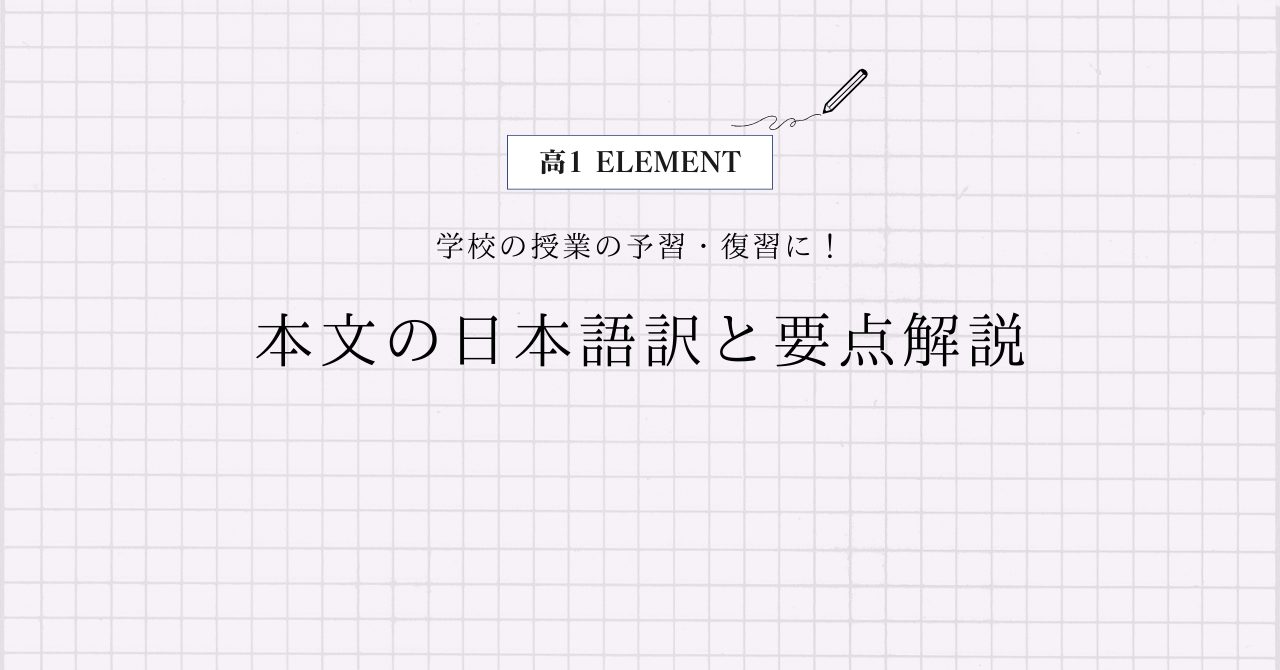三省堂 高1ELEMENT Lesson6 Section3の本文の日本語訳と重要箇所の解説です。
Lesson6-1, 6-2, 6-4の解説はこちらからご覧ください。
>高1ELEMENT Lesson6 Section1 本文和訳
>高1ELEMENT Lesson6 Section2 本文和訳
>高1ELEMENT Lesson6 Section4 本文和訳
- ELEMENT Lesson6 Section3 本文と日本語訳
- ELEMENT Lesson6 Section3 重要事項の解説
- When she was 24, she moved to Brazil with her husband.
- At first, her life there was hard because she couldn’t speak Portuguese at all.
- However, she was lucky to become friends with a boy named Luisinho, who became her Portuguese teacher.
- She enjoyed learning the language by listening to his speaking because it sounded more like singing.
- Amazingly, the meaning of words came across through his voice when he spoke to her.
- One day, Luisinho invited her to dance, but she was too shy to do so.
- He said, “Eiko, you have a heart, and it beats tokutoku tokutoku, right?
- If you listen to that, you can dance. Human beings are made that way!”
- Hearing these words, she was stunned.
- She recalled feeling that tokutoku when her father told stories using onomatopoeia.
- Until meeting Luisinho, she had focused only on the meaning of language, but he helped her to see the mystery and depth of it.
- She realized that even when we don’t know much vocabulary, if language has the right rhythm and sounds, it amazingly reaches the listener.
- ELEMENT Lesson6 Section3 まとめ
ELEMENT Lesson6 Section3 本文と日本語訳
When she was 24, she moved to Brazil with her husband.
「彼女は24歳のとき、夫と一緒にブラジルに引っ越しました。」
At first, her life there was hard because she couldn’t speak Portuguese at all.
「最初、彼女はポルトガル語をまったく話せなかったので、そこでの生活は大変でした。」
However, she was lucky to become friends with a boy named Luisinho, who became her Portuguese teacher.
「しかし、彼女はルイジ―ニョという名前の少年と友達になれて幸運でした。彼は彼女のポルトガル語の先生になりました。」
She enjoyed learning the language by listening to his speaking because it sounded more like singing.
「彼の話し方は歌っているように聞こえたので、彼女は彼が話すのを聞いて、その言語を楽しく学びました。」
Amazingly, the meaning of words came across through his voice when he spoke to her.
「驚くべきことに、彼が彼女と話すとき、単語の意味が彼の声を通じて伝わってきました。」
One day, Luisinho invited her to dance, but she was too shy to do so.
「ある日、ルイジーニョは彼女をダンスに招待しましたが、彼女は恥ずかしくてダンスができませんでした。」
He said, “Eiko, you have a heart, and it beats tokutoku tokutoku, right?
「彼は『栄子、君には心臓があって、それはトクトク、トクトクと鼓動するよね?』」
If you listen to that, you can dance. Human beings are made that way!”
「『それを聞けば踊れるよ。人間はそうやって作られているんだ!』と言いました。」
Hearing these words, she was stunned.
「この言葉を聞いたとき、彼女は唖然としました。」
She recalled feeling that tokutoku when her father told stories using onomatopoeia.
「父親が擬音語を使っている物語を話すとき、彼女はそのトクトクを感じたことを思い出しました。」
Until meeting Luisinho, she had focused only on the meaning of language, but he helped her to see the mystery and depth of it.
「ルイジ―ニョに会うまで、彼女は言葉の意味だけに焦点を当てていましたが、彼のおかげで彼女は言葉の不思議さと奥深さに気づきました。」
She realized that even when we don’t know much vocabulary, if language has the right rhythm and sounds, it amazingly reaches the listener.
「私たちはそれほど語彙がないときであっても、もし言葉に正しいリズムと音があるなら、その言葉は驚くことに聞き手に届くのだということに、彼女は気づきました。」

ELEMENT Lesson6 Section3 重要事項の解説
When she was 24, she moved to Brazil with her husband.
ここでは「接続詞when」が使われていますね。
“move”は「引っ越す、を動かす」といった動詞で、“husband”は「夫」という名詞になります。
At first, her life there was hard because she couldn’t speak Portuguese at all.
“at first”は「最初は、初めは」という重要表現ですね。
“life”は「生活、人生、命」という名詞で、“there”は「そこで」といった副詞、“hard”は「大変な、辛い」という形容詞です。
また、ここでは「接続詞because」も使われていますね。
“not~at all”は「まったく~ない」という強い否定を表す重要表現になります。“Portuguese”は「ポルトガル語」です。
However, she was lucky to become friends with a boy named Luisinho, who became her Portuguese teacher.
“however”は「しかし」という意味の副詞になります。
同じ意味で“but”がありますが,こちらは接続詞なので品詞が異なります。“but”は“文A,but 文B”というように,2つの文を繋ぐ際に使います。
“文A. But 文B.”というように,“but”を文の先頭に置いて1文だけで完結させるのは原則NGとなります。
“lucky”は「幸運な」という形容詞で、“become friends with~”は「~と仲良くなる、友達になる」という表現です。
そして“to become”は「不定詞の副詞的用法」になっていますね。
“name”は「と名付ける」といった動詞で、ここでは「過去分詞」になっていて、“named Luisinho”が直前の“a boy”を修飾しています。
“who”は「主格の関係代名詞」ですが、カンマが付いているので「非制限用法」で、“who became her Portuguese teacher”が先行詞“a boy named Luisinho”を修飾していますね。
「非制限用法」は名詞の補足説明をしたいときに使います。訳すときはふつう前から順に訳していきます。
She enjoyed learning the language by listening to his speaking because it sounded more like singing.
ここでは「接続詞because」が使われていますね。
“learn”は「を学ぶ、習得する」という動詞で、“enjoy”の目的語なので「動名詞」になっています。
“language”は「言語、言葉」、“speaking”は「話し方」といった名詞です。
“by”は「~によって」といった「手段・方法」を表す前置詞で、前置詞の後ろなので“listening”と「動名詞」になっていますね。
“by”の意味はいろいろあるので、以下に簡単にまとめておきます。
1.受動態とセットで「~によって」
2.”by+乗り物”で「交通手段」
3.「~までに」という期限
4.「~のそばに」という場所を表す
“it”は“his speaking”を指していて、“sound”は「聞こえる」という動詞、“sound like 名詞”で「~のように聞こえる」となります。
今回は“more”があるので、「話しているというより歌っているように聞こえる」といった比較のニュアンスになりますね。
Amazingly, the meaning of words came across through his voice when he spoke to her.
ここでも「接続詞when」が使われていますね。
“amazingly”は「驚くべきことに」という副詞で、“meaning”は「意味」、“word”は「単語、言葉」といった名詞です。
“of”は前置詞で、”A of B”の形で「BのA」というように後ろから前に訳します。
“come across”は「伝わる、理解される」といった意味で、“through”は「~を通じて」という前置詞になります。
“voice”は「声」という名詞、“speak to 人”は「人と話す」という意味ですね。
One day, Luisinho invited her to dance, but she was too shy to do so.
“one day”は「ある日」ですね。
“invite”は「を招待する」という動詞です。
後半の文は「too to構文」になっていて、“shy”は「恥ずかしい」という形容詞、“do”は「代動詞」になります。
“do so”は「ダンスをすること」を指していますね。
He said, “Eiko, you have a heart, and it beats tokutoku tokutoku, right?
“heart”は「心臓、心」という名詞で、“it”は“a heart”を指しています。
“beat”は「鼓動する、を叩く」という動詞で、“right”は文末に付けると「~ですよね?」という意味になりますね。
If you listen to that, you can dance. Human beings are made that way!”
ここでは「接続詞if」が使われていますね。
“that”は“tokutoku tokutoku“を指しています。
“human beings”はふつう今回のように複数形で使われる「人間」という名詞です。
“are made”は「受動態」になっていて、“that way”は「そのように」といった意味になります。
Hearing these words, she was stunned.
“Hearing these words”は「分詞構文」になっていて、接続詞“when”と主語の“she”が省略されて、“heard”が“hearing”とing形になっていますね。
もともとは“When she heard these words, she was stunned.”という1文です。
“stunned”は「唖然とした、呆然とした」という形容詞になります。
She recalled feeling that tokutoku when her father told stories using onomatopoeia.
“recall”は「を思い出す」、“feel”は「を感じる」という動詞です。“feeling”は「動名詞」になっていて、ここでは過去の意味になります。
“remember”や“forget”の後ろが「動名詞」の場合の訳し方と同じですね。
“that”は「その」という形容詞です。
また、ここでも「接続詞when」が使われていますね。
“onomatopoeia”は「擬音語、オノマトペ」という不可算名詞で、“using”が「現在分詞」として前から修飾しています。
Until meeting Luisinho, she had focused only on the meaning of language, but he helped her to see the mystery and depth of it.
“until”は「~まで」という前置詞で、そのため“meeting”は「動名詞」になっていますね。
“had focused”は「過去完了の継続用法」になっていて、“focus on~”は「~に焦点を当てる」という重要表現です。
“only”は「~しか、たった~だけ」といった強調を表す副詞になります。
“help 名詞 to 動詞の原形”は「名詞が~するのを助ける、手伝う」という重要表現で、“to”は無くてもOKです。
“mystery”は「不思議さ」、“depth”は「深さ、奥深さ」といった名詞で、“it”は“language”を指し、前置詞“of”によって「言葉の不思議さと奥深さ」という風に繋がっています。
“but”以下の文は直訳すると「彼は彼女が言葉の不思議さと奥深さに気づく(出会う)手助けをした」となりますが、今回は「彼のおかげで彼女は言葉の不思議さと奥深さに気づいた」と意訳しています。
She realized that even when we don’t know much vocabulary, if language has the right rhythm and sounds, it amazingly reaches the listener.
“realize”は「に気づく、を実感する」といった動詞で、後ろには「接続詞that」がありますね。
“even”は「~さえ」という強調を表す副詞で、ここでは「接続詞when」と「接続詞if」が使われていますね。
“not~much”は「あまり~ない」という意味で、“vocabulary”は「語彙」という名詞です。
“right”は「正しい」という形容詞、“rhythm”は「リズム、調子」、“sound”は「音」という名詞になります。
“it”は“language”を指していて、“reach”は「に届く、到達する」という動詞、“listener”は「聞き手」という名詞ですね。
ELEMENT Lesson6 Section3 まとめ
以上がELEMENT Lesson6 Section3の日本語訳となります。
「関係代名詞」「分詞構文」などの使い方をしっかり確認しておきましょう!
>高1ELEMENT Lesson6 Section1 本文和訳
>高1ELEMENT Lesson6 Section2 本文和訳
>高1ELEMENT Lesson6 Section4 本文和訳
何か分からない点や他に解説してほしい点があれば,お気軽にコメントしてください!


コメント